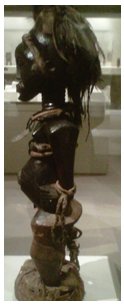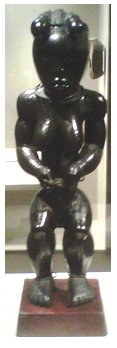Introduction
The beauty and uniqueness of African artwork remain distinctive from the historical ages to date. One of the most common artwork is that of sculptural designs that has individualism and highly values content that forms today’s historical analysis.
What is even more interesting of the sculptures is the introspective draping the sculptural works. There is mystical aspects inclining to the ancestral believe, worship and realm of the unknown. This paper forms a comparison as well as contrast between the Songye Power figures and the Fang Reliquary figures.
Songye Power Figures
Style of Songye Power Figures
This is a bilaterally symmetrical sculpture furnished with textural scales and an aesthetic form to reflect devotion. Entire surface of the Songye power figure draped with metals, wood, feathers and other material linings fastened systematically to produce a balanced appearance.
However, the Songye power figure originating from the Republic of Congo appears more distinctive with the indentations on the eyes, mouth and stomach areas that lack the tack lining. Like other similar traditional figures, Songye’s empty areas are stuffed with symbolical substances such as plants and animal remains or minerals around the geometrically outlined limbs, chest area, head and neck.
Copper nails with turret heads were common material featuring on the sculpture like other similar sculptures such as the Fang Reliquary sculptures. The finishes of the sculpture include beaded necklaces and naturalistic bands made of animal hide and pelts. Like most traditional figures, the pedestal base of the sculpture was also an integral section of the design. The figure below illustrates the sculpture.

Songye Power figure
Purpose of Songye Power Figures
The mouth of the Songye figure symbolically presents the offerings to the ancestral spirits who bestows fertility and provides protection against illnesses or misfortunes. Like other sculptures, the purpose of this figure was to strengthen the diviner’s powers of healing and maintain the societal wellbeing.
The diviner recommend the Songye sculpture for the patients treated using the herbal medicine, so that it can strengthen the healing process through divine protection. The large sized sculpture were communally owned but small designs customized for special personal needs such as private prayers reminiscent of protection against the evil spirits, heal ailments and communication to the ancestral spirits were available.
Like the other traditional sculptures, Songye provided divine powers for success for common endeavours such as hunting or gathering. Songye also had the role of protecting personal object and devotion. One special need that the figures addressed was enhancing fertility through support of conceiving or preventing miscarriages.
The genitalia of personal Songye would indicate the preferred gender for the first child. The figures were also an empowerment to the community such as illustrating the ideal masculine leadership style and like other similar sculptural designs, Songye were idiosyncratic to represent regional reputation.
Tribal Life of Songye Power Figures
Similarly, to other sculptural works such as the Fang Reliquary, Songye Power Figures are sculptures commissioned to top leaders such as chiefs or village elders, whose wishes are to benefit communities. Design of the sculpture also comes as an ancestral appraisal symbol to assist during crisis.
This meant that everyone in the society had to seek the divine intervention through sacrifices and special appeals to the sculptures. Other sculptures have special aspects that unite members just like the Songye sculptures. They share various traditional functions such as protection against enemies, illness, witchcrafts and procreation matters.
Fang Reliquary Figures
Style of Fang Reliquary Figures
On the other hand, the fang reliquary sculptures made from woodcarvings and metals have glittering surfaces and patina appearances especially after palm oil applications during rituals. Unlike other sculptors, the Fang Reliquary sculptures have daring human obstructions and receptacles of ancestral relics, thus referred to as the guardian of sacrosanct.
The relics are made of human bones. The enhancements idolized the ancestral forehead figures due to believe that force saturates in the head. The reliquaries made from joint backs preserved the relics and the figure provided guardianship through the symbolic trace of ancestral protection.
The sculpture is arguably the main influence of traditional wooden sculptures. It has an absolute physic appearance and in Gabon, the female sculpture emanates vitality. The fang reliquary figures have three distinct groups, one with a head crafted on a long neck, full sculptured figures and half figures or busts. The figures are either stand-alone or seated. Unlike other sculptures, the spherical but naturalistic of Fang Reliquary brings out sophistication from the simple carvings.
The neck is often round with the hands placed in diverse styles such as in front of the body, chest, and holding objects or placed on the knees for the seated figure. The navel is a cylindrically exaggerated protruding carve-out. The legs are shorter to give a stunted appearance, while the eyebrows and fore head projects some contours and arcs around the nose area. The eyes were made of rounded metal bits. These aspects making the sculpture unique compared to other forms such as the Songye sculptures as shown below.
Fang Reliquary figure

Purpose of Fang Reliquary Figures
Unlike Songye sculptures, Fang Reliquary sculptural work was to protect people from the spirits of the deceased. The figure was sacred but lost the value of sacredness once separated from the receptacles or repository chest of relics. Unlike other religious statutes, it also underwent sacred ritual of distraction after losing sainthood, which involved prayers, sacrificial offers to the ancestors and libations such as pouring of alcoholic drinks in honour of deity.
Tribal Life of Fang Reliquary Figures
Fang Reliquary sculptures are universal and blends the environment, other forms of tribal rituals, believe and communal characters better than other sculptures. The figures are mainly in seated positions on top of the bark boxes that held sacred relics thus depicting the guardian figures better than the Songye sculptures. A clear distinction from other forms was that it brought out youngster aspects as an emphasis over continuity of life.
Conclusion
The artworks came to existence when there was need for change such as migration, planting of new type of crops, before taking on a hunt, fishing and during nuisance, period, when people had to prepare for war. Both the art forms have a way of creating a blend between the unborn, the living and the living dead and represent religious symbolism. This is a clear indication that the African artworks were mainly based on sacred believes and sacrificial practices.